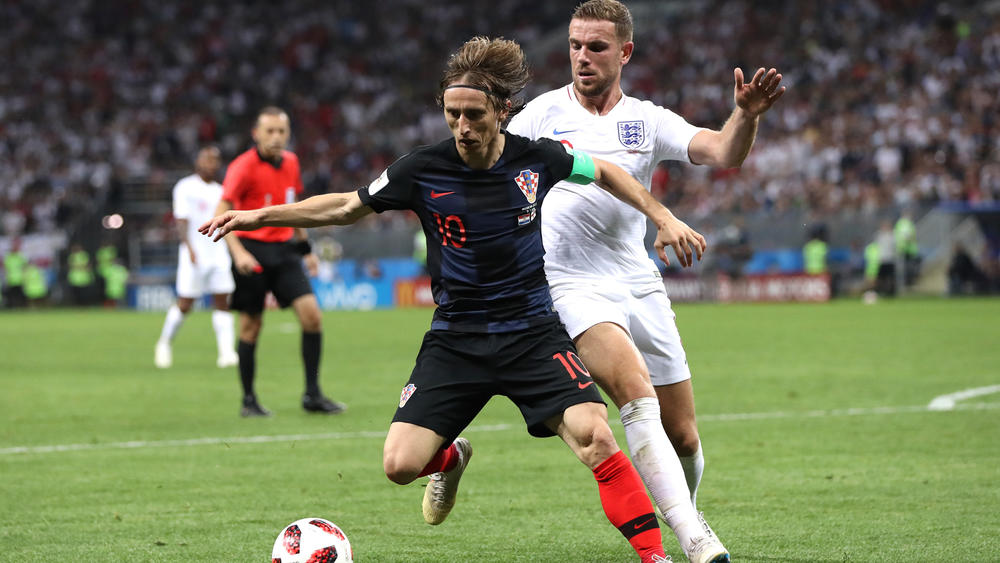Ballon d'Or 2018: The story of Luka Modric's magnificent career
Real Madrid's Champions League glory and Croatia's World Cup final run saw Luka Modric crown a superb career. The Ballon d'Or is his reward.

Lionel Messi and Cristiano Ronaldo made the Ballon d'Or their own personal property over the past decade.
In the end, the wait for the next superstar to tear it from their grasp proved misguided.
Real Madrid and Croatia midfielder Luka Modric is a performer of quiet brilliance, his story one of persistence.
It is tale that has taken him painstakingly to the summit of global football.
BALLON D'OR 2018December 3, 2018
Three in a row – the first time
Modric honed his skills as a youngster in Zadar, initially against the backdrop of a war-torn Croatia, and his slight frame meant sceptics had to be overcome. A trial with Hajduk Split was unsuccessful due to concerns over his size, but the loss of Modric's boyhood club was to be Dinamo Zagreb's gain.
A loan spell with Zrinjski Mostar saw him earn the player of the year award in Bosnia-Herzegovina as an 18-year-old. Another temporary spell at Inter Zapresic followed but he would soon become a fixture at Dinamo.
Get FourFourTwo Newsletter
The best features, fun and footballing quizzes, straight to your inbox every week.
Between 2005-06 and 2007-08, Dinamo won three consecutive league titles and the domestic double in two of those campaigns. Modric's velvet style was already apparent. He was one of the most sought-after talents in Europe.
Croatia's golden generation
After progressing through his nation's youth ranks, Modric made his international debut against Argentina in March 2006 and he featured twice at that year's World Cup as a substitute.
Under head coach Slaven Bilic, Croatia won a place at Euro 2008, preventing England from doing so during qualification in the process. Modric's early penalty secured an opening win against co-hosts Austria and he dazzled in a 2-1 victory over Germany.
A penalty shoot-out defeat to Turkey in the quarter-finals stung, but a golden future surely awaited Modric, Ivan Rakitic, Darijo Srna and the rest. Failure to reach the 2010 World Cup presented an alternative reality.
Luka Modric is the first Croatian player who wins the Ballon d'Or! December 3, 2018
Earning his Spurs
Barcelona were among the clubs linked with Modric's services before he plumped for Tottenham in 2008. Despite a relatively slow start to life in England and familiar questions about his physique, he began to flourish after Harry Redknapp replaced Juande Ramos as Spurs boss.
Alongside the likes of Rafael van der Vaart and Gareth Bale, Modric was integral as Spurs reached the Champions League in 2010-11 and enjoyed a memorable run to the quarter-finals.
Real Madrid ended their dream and the start of the following campaign was dominated by speculation over the playmaker's future as he angled for a move to Chelsea.
Spurs and Redknapp held firm and Modric shone enough during his final campaign at White Hart Lane to bring Madrid to the table.
Kings of Europe
Facing up to some of the most imposing Barcelona sides in their history has not proved a simple task for Modric and his esteemed Madrid team-mates. He only has a solitary LaLiga title to his name over the course of six full seasons in the Spanish capital.
In Europe, it has been a different story. Playing under Carlo Ancelotti and reunited with Bale, Modric completed 120 minutes as Madrid overcame Atletico 4-1 in extra time in the 2014 Champions League final. It was a similarly gruelling ask against the same opponents in 2016, with penalties needed at San Siro.
Gracias a todos May 29, 2016
That was the start of Zinedine Zidane's glorious spell of success. The 2017 final featured Madrid's finest performance of the era, with Juventus demolished 4-1 in Cardiff despite a stunning goal from Modric's international team-mate Mario Mandzukic. This year's 3-1 victory against Liverpool in Kiev ended with Modric having played every second of Madrid's four final wins in five seasons.
Making good on Croatia's promise
Euro 2012 and the 2014 World Cup ended at the group stage for Croatia but a sublime Modric volley secured victory and revenge over Turkey in their Euro 2016 opener. They also beat Spain and were arguably the most impressive team in the round-robin phase.
A turgid last-16 meeting with Portugal ended in an extra-time defeat and the dream died. Russia 2018 represented the final chance for this generation to emulate the semi-final showing of Davor Suker, Zvonimir Boban and other heroes of Modric's youth at France 98.
From the first match against Nigeria, Modric played like a man who would not be denied. He scored a penalty as the Super Eagles were swatted aside 2-0 and crashed in a brilliant long-range strike as Lionel Messi's Argentina were demolished 3-0.
During the knockout rounds, an aging side went to the well again and again. Modric missed from the spot in extra time but scored in the shoot-out as Croatia edged past Denmark before defeating the hosts via similar means. Zlatko Dalic's men had to come from behind to sink England in extra-time.
That meant a final and a bridge too far as France ran out 4-2 winners. But Modric's place among the greats – underscored by this Ballon d'Or triumph - was secured forever.
